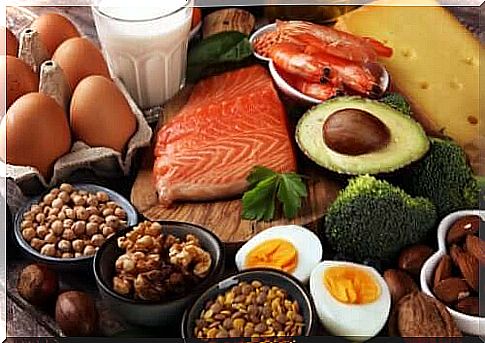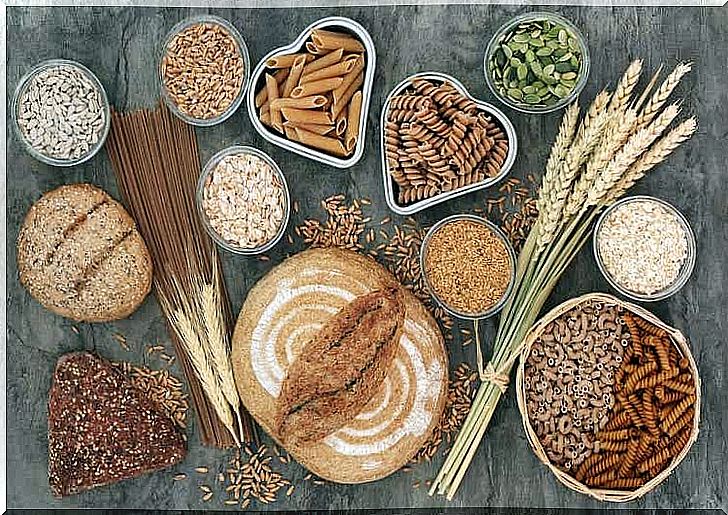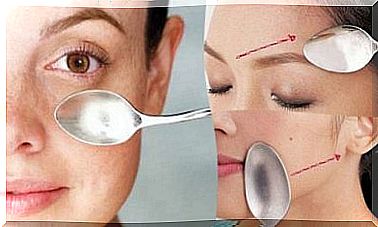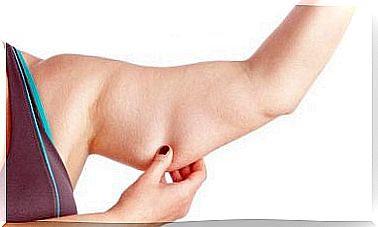The Quality Of A Diet Versus The Type Of Diet

The statement that the quality of a diet is more important than the type of diet, in fact, has a scientific basis. For example, it’s not just about controlling the number of calories you use to lose weight. You also need to choose the healthiest foods within the calorie adjustment.
One study found that people on a diet increased the likelihood of premature death by eating low-quality foods. However, they reduced the risk of premature death by avoiding junk food and sweets.
As you continue reading this article, you will learn about the most recommended foods, the right amounts and the importance of variety in your diet.
Which foods contribute positively to the quality of a diet?
Within a certain type of diet, it is not just the number of calories and nutrients you get in you that counts. According to an expert group, diets should consist of high quality food. That is, those who are less likely to promote weight gain.
In this group we find the food that is part of the Mediterranean diet and the DASH diet, which follow healthy diet patterns.
Vegetables and fruits
The American Centers for Disease Control and Prevention promotes the consumption of vegetables and fruits for weight control and a healthy diet. This reduces the risk of chronic diseases.
Fruits and vegetables provide a high water and fiber content, which reduces calorie intake. They also provide phytochemicals, such as polyphenols, and antioxidants that provide a recognized positive effect.
Whole grains
Fiber has a satiating effect and takes longer to digest, since the structure requires more chewing. In general, it provides fewer calories considering the amount you eat.
A group of researchers comment on the benefits of fiber for weight control. Wheat bran, which is found in whole grains, reduces the energy density of food and appetite.
Eating about 14 grams of fiber a day reduces calorie intake by 10%, and people lose almost 4.5 kilos of weight in 2.8 months. It is also associated with good gastrointestinal health and control and prevention of certain diseases, such as type 2 diabetes.

Also read: 4 tips for overcoming emotional eating
Healthy fat
The Spanish Society of Dietetics and Food Sciences, along with other societies studying the Mediterranean diet, emphasizes the importance of the quality of fat, rather than quantity. From this perspective, monounsaturated and polyunsaturated fats (omega 3) are considered the key to preventing chronic diseases.
According to the Iberoamerican Nutrition Foundation, the healthiest fat is provided by seed oils, olive oil, algae and seafood. The contribution of omega-3 fatty acids such as EPA and DHA is associated with a reduced risk of cardiovascular disease, and metabolic syndrome.
Healthy proteins
Inclusion of lean protein in diets to control calorie intake is very important. These proteins include lean meats, such as fish, seafood, skinless poultry, and legumes (beans, lentils, soybeans, peas).
From a nutritional point of view, Quesada and Gómez recommend supplementing legume proteins with cereals. This improves amino acid quality and increases nitrogen absorption and utilization.
Which foods reduce the quality of a diet?
Foods that are considered low quality are included in unhealthy diets. Increasing the daily portions is related to weight gain. Within this group are the following.
Refined and added sugar
Professor Claudia Cabezas points out that refined and added sugars in certain products, such as sweetened beverages, cakes, ice cream and pastries, are considered to be of concern in the diet. He argues that high sugar consumption is associated with various diseases, such as obesity, obesity, diabetes. and cardiovascular disease.
They can also contribute to the development of psychological disorders, such as hyperactivity. Therefore, their consumption is regulated in processed products.
Trans fat
Epidemiological studies link the consumption of saturated and trans fats to increased serum cholesterol, cardiovascular disease and diabetes. Given this evidence, the World Health Organization (WHO) recommends that less than 1% of the total calories consumed come from trans fatty acids.
According to a team of nutritionists, we find them in hydrogenated margarine, commercial frying fat, high-fat baked goods, donuts, hamburgers, french fries and high-fat cakes.
Refined cereal
Refined cereal contains little fiber and a lot of starch. They are considered the most important energy sources in the population. However, the content of minerals such as iron, calcium, magnesium, zinc and B vitamins is lower than in whole grains, as they have been lost during the refining process.
Process food
The Food and Agriculture Organization of the United Nations (FAO) describes processed foods as the products that consist of several ingredients that are developed industrially. Popkin and Reardon state that they contribute to obesity, obesity and other non-communicable diseases since they include additives, saturated fats, added sugar and a lot of salt.
Processed foods include canned food, processed meats, nuts, smoked and hardened foods, margarine, mayonnaise and syrup.
What is the recommended amount of calories in a quality diet?
If you want to control your weight, the amount of calories always has an influence . By consuming fewer calories than we use, you will be able to reduce body weight. But that is not the only important thing. Even diets that are careful about the number of calories are not always the best.
A study published in the Journal of Clinical Investigation reports that it all depends on the type of food you choose within the diet pattern you follow. For example, someone who eats 1,500 calories with junk food will lose the same weight as those who consume 1,500 calories from healthy food.
However, junk food can cause reactions. Foods high in sugar increase the release of insulin. This leads to increased fat storage and impending weight gain.
The number of calories you should consume to lose weight should be calculated by nutritionists and distributed with healthy foods. Fruits, vegetables, beans and whole grains make the body feel full and satisfied.
Even though they are healthy foods, it does not mean that we can eat everything we want. On the contrary, we must be careful with portions so as not to overdo it.
For example, according to the INCAP food composition table, a 200 gram serving of plantain can provide 200 calories. If eaten 3 times a day, it contributes almost half to an average low calorie content.
Therefore, we must be careful and measure the calories from the healthiest foods. In this way, we guarantee the recommended intake and diversity of nutrients. Healthier does not mean overeating.

The importance of variety in a high quality diet
The variety in a diet guarantees the right supply of energy and nutrients to meet your needs and prevent deficiencies. To achieve this, the healthiest foods from different groups should be included.
It is not an ideal diet, nor is it a complete product that provides all the nutrients in the required amounts. For example, oranges contain vitamin C, but not vitamin B12. We find this in meat. And if we need fiber, we must resort to legumes or fruit.
Any diet intervention should be planned and performed by a nutritionist from the beginning. The number of calories to be consumed, the choice of foods, the adjustment of macro- and micronutrients to ensure the requirements, as well as the development of the diet, must be approved by a nutritionist.
Science has shown that the quality of a diet is more important than the type of diet, and has become a reliable indicator of achieving healthy nutrition. Weight loss plans should not only consider the amount of energy and nutrients, but also the quality of the food.









